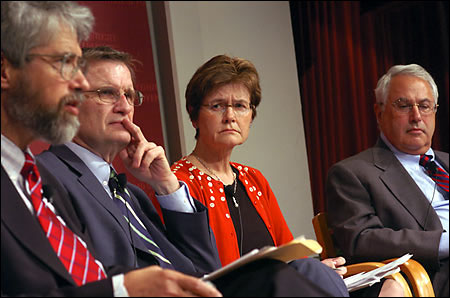Energy panel participants discuss reform
Bipartisan effort may inform congressional debate

Participants on an independent bipartisan panel examining energy reform discussed recommendations to Congress Thursday (April 14) that would see caps on greenhouse gas emissions, new investments in nuclear and renewable technology, and financial support for clean coal plants.
The panelists, who addressed the Kennedy School of Government’s John F. Kennedy Jr. Forum, were members of the National Commission on Energy Policy. Chaired by Teresa and John Heinz Professor of Environmental Policy John Holdren, who hosted the event, the commission included representatives from several different constituencies interested in energy policy.
Thursday’s panel discussion featured Holdren, IOP Director Philip Sharp, who served as the commission’s congressional chair, commission member Susan Tierney of The Analysis Group, and commission consultant William Rosenberg, a visiting senior fellow at the Kennedy School’s Center for Business and Government and the Belfer Center for Science and International Affairs.
The commission began work in 2002 and met a dozen times before issuing its report in December 2004 in Washington, D.C. Over the course of its deliberations, the commission sponsored 35 background papers on different aspects of the energy picture.
Two issues proved the most controversial in the commission’s deliberations, panelists said. The first is the recommendation to begin curbing emissions of carbon dioxide by issuing tradable emissions permits. The permits could be traded between companies so those that don’t want to invest in equipment to lower carbon dioxide emissions could purchase surplus permits from companies that do invest in the technology and whose emissions are lower than their permits allow.
The second controversial recommendation, panelists said, would increase automobile fuel efficiency standards by between 10 and 20 miles per gallon. Tierney said there was sharp debate on the commission over the best way to address fuel consumption and emissions from automobiles. Transportation consumes 40 percent of the energy used in the United States, Tierney said, and it is almost completely petroleum based. Raising the fuel economy standards for passenger cars hasn’t been done since the 1980s, and raising the efficiency standards was thought to be more politically palatable than other alternatives to encourage efficiency, such as a fuel tax.
“Nobody thought a tax was realistic, but you have to do something about oil, about the transportation sector,” Tierney said. “We’d have Congress move the ball significantly [on fuel efficiency].”
The commission also recommended supporting the commercialization of clean coal technology. The technology uses coal, an abundant fuel in the United States, as a source for gas that can then be burned in natural gas power plants, easing the natural gas supply crunch and reducing the need for imported gas.
Another major recommendation would increase funding for research into advanced nuclear power technology. Nuclear power is an alternative that has become increasingly attractive in recent years because it doesn’t emit carbon dioxide, the major gas implicated in global warming, Sharp said.
The package of reforms was designed to be revenue neutral to make it more politically palatable in today’s difficult budget times.
Sharp, who specialized in energy policy during the 20 years he represented Indiana in the U.S. House, said he thought Congress would break a stalemate over energy policy that has existed for several years and pass energy legislation this year.
But he also said he thought the more politically difficult issues, such as moving to curb carbon dioxide emissions or increasing automotive fuel efficiency, would be absent from the legislation.
“It won’t fundamentally affect our oil dependency and it won’t address climate change, so we’ll have to go back again and again,” Sharp said.




